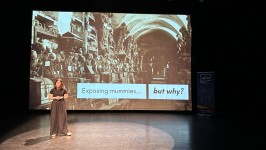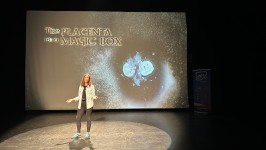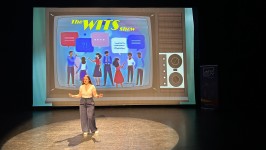Finale de la seconde édition du concours "My 3mn-PhD Thesis" UNITAEt les vainqueurs sont...
Le 4 juil. 2024 de 13h30 à 16h30

"My three-minute PhD thesis" est un concours de vulgarisation scientifique ouvert à tous les doctorants des 12 universités membres d'UNITA. Les participants devaient présenter leur recherche d'une manière efficace à un public non spécialisé.
Suite à une première édition réussie, le concours est revenu cette année pour une seconde édition. Le concours était organisé en deux étapes : dans un premier temps, chaque université a organisé sa propre sélection locale. Dans un deuxième temps, les 18 doctorants sélectionnés ont participé à la finale internationale organisée en présentiel à l'UPPA le 4 juillet, à la Centrifugeuse sur le campus de Pau.
Les doctorants ont disposé de 3 minutes pour présenter un exposé convaincant sur leur thèse et son importance, de manière claire et concise.
La compétition a également été diffusée en direct sur la chaîne YouTube de l'UPPA.
Vainqueurs
|
Première place : Rebecca SABATINI de l'Université de Turin, Italie Thème : Cultural Heritage Titre de la thèse : "Exposing humans: Mummies, rituals and heritage-making" | |
|
Deuxième place : Irene VIOLA de l'Université de Turin, Italie Thème : Veterinary Sciences Titre de la thèse : "Establishment of an in vitro model to study autophagy during early placenta development in sheep" | |
|
Troisième place : Karla CSUROS de l'Université Ouest de Timisoara, Roumanie Thème : Philology/Cultural Studies Titre de la thèse : "Get to Work! A Corpus-Based Inquiry into the language of Contemporary American Workplace Sitcoms" |
Ordre de passage
- Daniel ALÁEZ GÓMEZ - UPNA, Science and Industrial Technologies: Digital-twin development of VTOL UAVs
- Amelia TOTH - UVT, History: Integrating the Banat Region into the Kingdom of Romania from a Legal Perspective
- Samuele SUTERA - UNITO, Medicine: New advances in Oral Oncology: Role of Microenvironment in Oral Carcinogenesis
- Carmen RODRIGO CARBÓ - UNIZAR, Medicine: Nutritional Interventions Studies in Patients with Type 2 Diabetes Mellitus
- Muhammed AMINU - UPPA, Civil Engineering: Study of thermo hydraulic transfers in concrete at fire situation: effect of mechanical loading, simulation and experiment
- Praveena PACHAIAPPAN - UNIBS, Engineering/Medicine: Waste to Wastewater Treatment: Sustainable Remediation from Dyes and Metals using Mono-Combusted Sewage Ash
- Mariana FIADEIRO - UBI, Biomedicine/Neuroscience: Pre-clinical validation of a new therapeutic approach to slow down Parkinson's disease progression
- Manuel SOTO RAMOS - UNITBV, Computers and Information Technology: Increasing Learning Motivation of the Solid Geometry Contents in Twelfth Grade Using Extended Reality Technologies
- Laura LARRODERA - UNIZAR, English Studies: What Does it Mean to Be Human? (Bio-)Bots and AI in 2010s Feminist and Queer Science Fiction
- Karla CSUROS - UVT, Philology/Cultural Studies: Get to Work! A Corpus-Based Inquiry into the language of Contemporary American Workplace Sitcoms
- Liuder Isidoro RODRÍGUEZ COCA - UNITBV, Forestry: Genetic diversity and population structure of Cuban forest tree species
- Olivia RENARD - UPPA, Physio-biology: Microbial transformation of herbicides in agricultural soils and drinking water catchments
- Rafael LOPES - UBI, Sports Science: Design of a dedicated dashboard for Women's football analysis and development
- Ana Laura GIAMBELLUCA - UPNA, Science and Industrial Technologies: Potential of the combined use of radar, optical observations and LiDAR data for the characterization of forest masses
- Rebecca SABATINI - UNITO, Cultural Heritage: Exposing humans: Mummies, rituals and heritage-making
- Alejandro FRESNEDA CRUZ - UNIZAR, Chemical and Environmental Engineering: Microwave-heating assisted valorisation of waste plastics
- Francesca TANGHETTI - UNIBS, Engineering: Innovative systems for defining the degree of risk of the rural historical-architectural heritage in the planning of preventive conservation and reuse and valorisation process
- Irene VIOLA - UNITO, Veterinary Sciences: Establishment of an in vitro model to study autophagy during early placenta development in sheep





